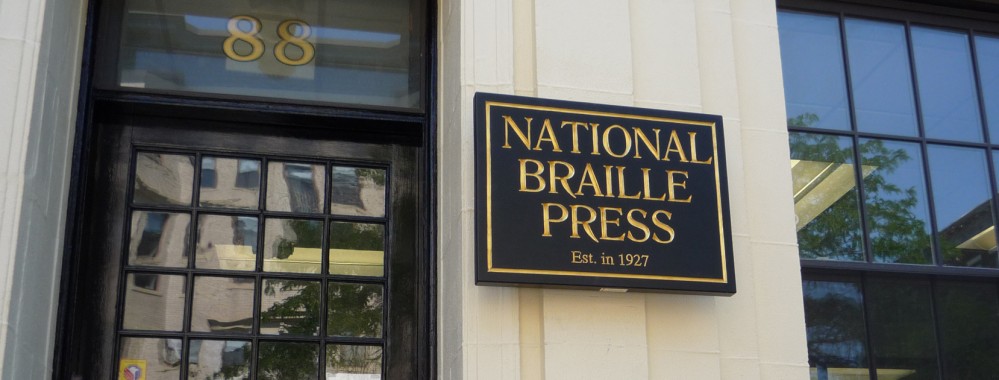When I posed the question, “Are we witnessing the demise of braille?” in last week’s blog post, I anticipated it would strike a nerve. After working at NBP for nearly 10 years, I know how passionate readers feel about braille and credit it for their educational and professional success. My NBP colleagues and I share in their assessment of braille as an essential means for literacy.
I am wondering, however, what the responses would be from parents, teachers, school administrators, and others who have the power to make decisions about braille learning for blind children. Do they feel as passionately as “Jeff” who posted, he would “hate to see a total shift away from the use of braille because in reality, it’ll lead to whole generation of illiterate people.”? Will the out-of-the box accessibility, via audio, of some of today’s technology change the way blind children will learn? There are many factors at play when you consider the education of blind children – limited public-school resources, the shortage of TVI’s, and a broad brush approach to serving kids with disabilities—I just hope that braille does not get lost in the shuffle.
Equally passionate were the responses concerning braille in the digital age. While opinions were varied, one sentiment is clear – technology does not replace braille. Instead, technology has unlimited potential to enhance and increase braille usage but the high cost of assistive technology remains a critical barrier that must be addressed. As one deaf/blind woman stated, “It’s sickening that braille is offered for premium pricing.”
I am thrilled that so many took the time to respond to this blog post. I want to dig deeper into this issue, and I am currently working with my colleagues to develop a short survey on how braille is used today—with and without technology. Stay tuned for more information on that survey. Thank you for your enthusiasm and let’s keep this dialogue going. I don’t know if the future of braille depends on it, but I don’t want to take any chances.

Pingback: Possibilities – Blind Conventions 1 | Emilia Jordan
I totally agree. Braille should be made more accessible using new technology and efforts should be made to reduce the costs of such technology (a priority!). As a parent of a blind child, it is frustrating to see her having to take so much time learning more because of the need for contracted Braille and all the rules. I have to admit, it seems like there should be a better system. However, there is no way I will just let her get by the easy way by not learning Braille to the very best of her ability.
LikeLike
to my opinion braille is a prehistoric worthless totally obsolete invention. it is very easy to construct computer programs that can read any text line by line and spell the words on request. i wrote such a program, even multilingual docs are possible, for the study of foreign languages. only human voice audio, no boring tts. available for free, mail worms.fred at hotmail.com. main problem: people too stupid to understand, attached to existing technologies, their backs to the future!
LikeLike
Audio is a great tool for blind people, but audio paired with braille is a much more effective way to learn. Imagine learning grammar skills or math and science equations with audio only. Braille not only actively engages your brain when learning, one can re-read a math formula more effectively to understand complex equations and processes. Finally, one of the most compelling examples is that over 70% of blind adults are unemployed, but the majority of the 30% that are employed are braille readers. This “prehistoric code” still seems pretty relevant today. Don’t forget that the alphabet origin began over 3,400 years ago and is still going strong.
LikeLike
How about when technology just plain doesn’t work? How many times have I had a student tell me, “My Stream was all messed up,” or “My student account isn’t accessible for some reason,” or the battery is no good, requiring a plug-in?
My response is, “Where was your textbook?” We need to continue to emphasize the importance of Braille reading and writing, starting in a child’s early years.
Holly Brooks
LikeLike
Dots right! Can’t read and write print with your eyes at a competitive speed and competitive accuracy with your fellow humans at school or on the job or off on your lonesome when you need to know information or give information – including to your future self? What else will work? Why not use one of your other senses? Hands down (hah!), Braille beats out Viking runes on wood or stone, Babylonian cuniform on clay tablets, the Aztex’s “Quipus (or khipus), sometimes called talking knots” (Wikipedia), and a string around the finger. Use your ears? Braille can be written and organized and read back now or in the future; speech and dictation are much less flexible for retreival, even with a computer using a Find command. And, by the way, how do you use your computer for taking notes about how to use your computer when you are trying to learn how to use your computer? B R A I L L E means – Be Real And Investigate Learning Literacy Equality.
Want more reasons for Braille? Follow the links on the National Federation of the Blind’s Braille Initiative webpage at http://www.Braille.org or check up on Braille legislation at
https://nfb.org/laws-and-legislation.
Lorraine Rovig
LikeLike